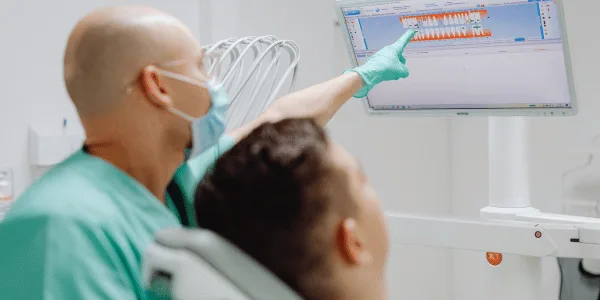Artificial intelligence in dentistry is no longer just talk; it’s transforming how dental professionals diagnose, treat, and manage their practices today. With 35% of dentists globally implementing AI in their practices and reporting overwhelmingly positive outcomes, the dental industry is experiencing its most significant technological revolution since the introduction of digital X-rays.
The Current State of AI Adoption in Dentistry
The numbers tell an interesting story about AI’s rapid integration into dental care. AI in the dental market is projected to grow at a compound annual growth rate (CAGR) of 26.5% between 2023 and 2030, reaching a value of $2.7 billion by 2030, according to recent market research. Even more compelling, AI-powered imaging tools can identify dental caries, periodontal diseases, and oral cancers with up to 90% accuracy, compared to the 40% accuracy of conventional X-rays.
This technological advancement comes at a crucial time for the dental industry. With an ongoing staffing shortage affecting practices nationwide, dental professionals are seeking innovative solutions to maintain high-quality patient care while managing operational challenges. GoTu’s dental talent marketplace has connected over 100,000 dental professionals with practices seeking flexible staffing solutions, and increasingly, these professionals are working in AI-enhanced environments.
Key AI Statistics for Dental Offices & Professionals in 2025
- Global Market Growth: AI in Dentistry Market Size is valued at USD 421.0 Mn in 2024 and is predicted to reach USD 3,117.6 Mn by the year 2034 at a 22.3% CAGR
- Diagnostic Efficiency: AI has reduced diagnostic times by up to 50%, allowing dentists to focus more on patient care
- Cost Savings: A report showed that using AI can result in operational cost reductions of 20-30% due to automation and predictive maintenance
- Patient Satisfaction: AI-driven tools have increased patient satisfaction rates by over 35%, particularly in diagnosis and treatment transparency
Using ChatGPT for Dentists
One of the most accessible AI tools helping dental practices is ChatGPT. This advanced language model is helping dental professionals streamline everything from patient communication to administrative tasks, making it an essential tool for modern dental practice management.
Practical Uses of ChatGPT in Dental Practices
Patient Education and Communication
ChatGPT can generate easy-to-understand explanations of dental procedures, post-treatment care instructions, and oral hygiene tips. For example, if a patient is anxious about a root canal procedure, dentists can use ChatGPT to create clear, reassuring explanations tailored to the patient’s specific concerns.
Administrative Efficiency
ChatGPT excels at automating routine administrative tasks that often burden dental staff. ChatGPT can create step-by-step instructions tailored to your practice’s unique needs, including Standard Operating Procedures (SOPs) for managing patient flow, scheduling protocols, and staff training materials.
Marketing and Content Creation
Dental practices are using ChatGPT to create marketing content. ChatGPT can help you generate website copy, blog posts, and service descriptions that attract potential patients and improve your website’s search engine ranking. This is particularly valuable for practices looking to compete with larger dental service organizations (DSOs) that typically have dedicated marketing teams.
Script Development and Training
ChatGPT can draft professional policies, such as patient communication guidelines or financial agreements, ensuring consistency in patient interactions. This is especially valuable for practices that rely on temporary dental staff from platforms like GoTu, where clear protocols help maintain service quality regardless of staffing changes.
AI-Powered Diagnostic Tools: The Future of Dental
Specialized AI tools are revolutionizing dental diagnostics. AI applications in caries detection, endodontics, dental restorations, tooth surface loss, tooth shade determination, and regenerative dentistry are becoming increasingly sophisticated.
Advanced Imaging and Detection
The most significant impact of AI in dentistry lies in diagnostic imaging. AI-powered tools can analyze dental images (including radiographs and intraoral photographs) to identify abnormalities and aid in early disease detection. This technology is particularly valuable for:
- Early Caries Detection: AI can identify cavities before they become visible to the human eye
- Periodontal Disease Assessment: Machine learning algorithms can detect bone loss patterns and predict disease progression
- Oral Cancer Screening: AI-powered tools can identify suspicious lesions that might be missed during routine examinations
FDA-Approved AI Tools
The regulatory acceptance of AI in dentistry is growing rapidly. As of 2024, 108 AI-powered dental products have received FDA approval, reflecting the growing regulatory acceptance of AI technologies. This regulatory support provides dental professionals with confidence in integrating these tools into their practice workflows.
Embracing the Future of Dentistry
The integration of AI in dentistry represents more than just a technological upgrade; it’s a fundamental shift toward more precise, efficient, and patient-centered care. While the integration of AI and augmented intelligence in dentistry is progressing, it’s important to note that human expertise and clinical judgment remain essential, as emphasized by the American Dental Association.
The question isn’t whether AI will transform dentistry, it’s whether you’ll be among the leaders driving that transformation or following in their wake. Start exploring how to integrate AI in your practice, and discover how these powerful tools can enhance your practice and advance your career in the rapidly evolving world of modern dentistry.







